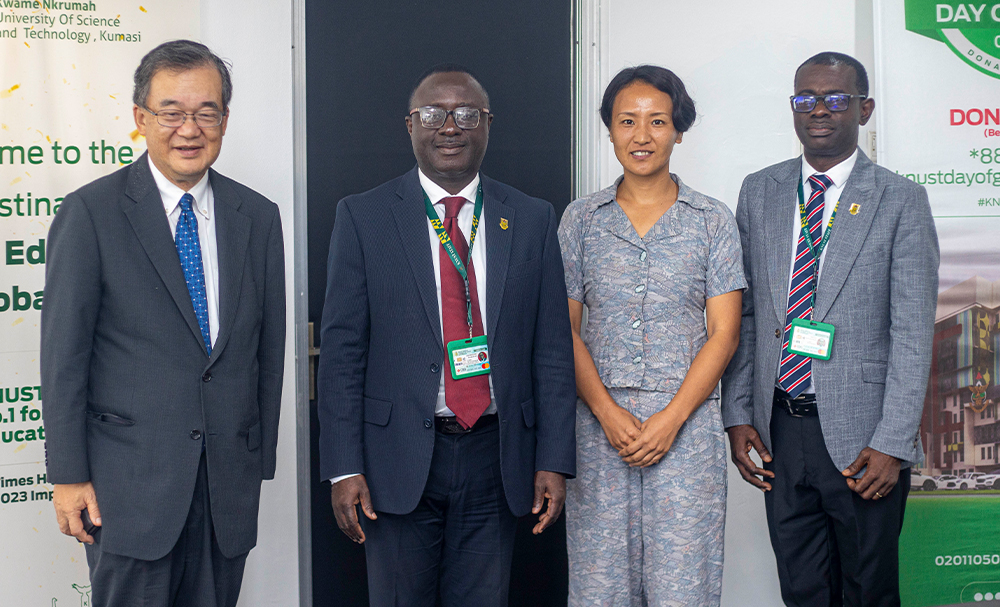The Pro Vice-Chancellor of the Kwame Nkrumah University of Science and Technology (KNUST), Kumasi, Professor David Asamoah, has held discussions with the Ambassador of Japan to Ghana, His Excellency Hiroshi Yoshimoto, on strengthening academic and research collaboration between KNUST and leading Japanese universities.
During a courtesy visit to KNUST, Ambassador Yoshimoto expressed his interest in deepening ties between Japanese and Ghanaian higher education institutions. He commended KNUST for its strong academic reputation and contributions toward achieving the Sustainable Development Goals (SDGs).
“KNUST is one of the most distinguished universities in Ghana, known for its high-quality education and research impact, particularly in areas related to the SDGs. We look forward to exploring opportunities for collaboration between Japanese universities and KNUST in fields such as herbal medicine, climate change, and sustainable agriculture,” Ambassador Yoshimoto said.
He noted that several Japanese universities, including Kyoto University, Keio University, Nagoya University of Commerce and Business, Ritsumeikan Asia Pacific University, Sophia University, Tohoku University and Waseda University, have already signed memoranda of understanding (MOUs) with KNUST.
Ambassador Yoshimoto expressed optimism that these partnerships could be revived and expanded to include new areas of mutual interest. He revealed that the University of Tsukuba has recently secured subsidies to strengthen exchange programmes with Ghanaian universities, including KNUST, from 2025 to 2029.
“With this development, KNUST can take advantage of the available opportunities and explore new areas of collaboration,” he added.
The Ambassador also discussed potential partnerships with Nagaoka University of Technology and the Japan International Cooperation Agency (JICA) to foster innovation and entrepreneurship.
Receiving the Ambassador on behalf of the Vice-Chancellor, Professor David Asamoah highlighted KNUST’s readiness to engage in joint research and innovation initiatives, particularly in key national development areas.
“As a research-intensive university, our scholars are focusing on critical issues such as illegal mining (galamsey), climate change mitigation, and net-zero carbon emissions. We already have proposals in these areas and are eager to partner with Japanese institutions to advance our shared objectives,” Professor Asamoah said.
He noted that the Faculty of Pharmacy and Pharmaceutical Sciences, which houses the Department of Herbal Medicine, presents enormous potential for joint research in herbal and traditional medicine. He also identified the KNUST School of Business as a promising area for collaboration.
“We would be very happy to deepen existing partnerships with sister universities in Japan to strengthen our Innovation and Incubation Hub, which supports student-led start-ups and research-driven ventures,” the Pro Vice-Chancellor said.
Professor Asamoah encouraged the delegation to begin preparatory steps toward renewing existing MOUs and establishing new ones with interested Japanese universities. Discussions also covered possible collaborations in addressing mercury pollution from illegal mining, developing sustainable agricultural technologies, and advancing research on climate-resilient crops.
The Registrar, Mr. Benjamin Boampong Owusu, said KNUST remains committed to partnerships that promote shared knowledge and development.
“KNUST strongly believes in the power of collaboration and knowledge exchange. Our partnerships are designed to yield mutual benefits that contribute to national and global development,” he said.
Ambassador Yoshimoto assured the University that his office would facilitate introductions to relevant Japanese universities and agencies such as JICA to support these initiatives.

















